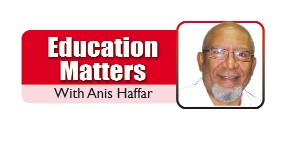Teaching courses in “Critical Thinking†is one of the most inspiring and rewarding experiences I have ever had. It started with my training in the state of California (USA) to coordinate a GATE (Gifted And Talented Education) programme in a public school.
In Ghana, Critical Thinking was embodied in some courses I designed for some school proprietors and teachers in Accra on the advice of Mrs Comfort Engmann (North Ridge Lyceum).
For the past years, it’s been a pleasure teaching that course for first year students at Accra College of Medicine.
On reflection, the prospects of expanding students thinking enlarges who they are as human beings so they could truly value the world they live in, and particularly design their role in making the world a better place than they found it.
The personal transformation of both teachers and students and the impact on the quality of their lives affect those around them generally.
Effective communication
One key aspect of Critical Thinking is “Effective Communication†which is defined as the ability to convey information to another clearly.
Such skills help facilitate the sharing of information between people or within organisations.
Communicating effectively prevents misunderstanding so that ideas and concepts are heard with clarity for people to act on them with precision.
The ability to listen, understand and take action on what other people say marks progress.
I was being interviewed recently for a personality profile on a TV station and listeners sent in various questions relating to my experiences in teaching the GATE methodology in Ghana.
One listener asked: “What must I do to be closer to my success?†First of all, I had no idea what success looked like to the caller, or exactly what he had in mind so that he’d know when he had achieved it. It’s like the proverbial looking for a needle in a haystack.
It also reminded me of the following fable:
Fable on fortune
Once upon a time, Donkey gathered up his life’s savings and started off to find his fortune. Before he had travelled far, he met Kangaroo.
“Hey, good friend, where’re you going?†asked Kangaroo. “I’m off to find my fortune,†Donkey replied. “Good. You’re in luck,†said Kangaroo. “For a fee, you can have these strong hind legs to help you hop and jump, and you can get there much faster.â€
“That sounds great,†said Donkey as he paid the money. With the new hind legs, he hopped, jumped and increased his speed.
Soon, he came upon Eagle who asked: “Hey, good friend, where are you headed?†“I’m off to find my fortune,†replied Donkey.
“You’re in luck. For a fee, I will let you have these powerful wings so that you will be able to travel much faster.†So Donkey bought the wings with his remaining money, and flew off.
Soon he came upon Shark, who asked: “My good friend, where are you off to at such great speed?†“I’m out to find my fortune,†replied Donkey.
“You are really in luck,†said Shark. Opening his mouth wide, and pointing to it, he said: “You may take this short cut, find your fortune faster, and save your breath; all for free.†“Great, thanks,†said Donkey as he leaped straight into Shark’s mouth.
Sense of purpose
The morale of this story is that without clear objectives, no matter how determined one is, no matter how ambitious, no matter how great the effort, no matter how much money, fortune or purpose would still be elusive; and one is liable to end up in the wrong place, and — in some cases — perish!
As they say, ‘If you don’t know where you’re going, any stray wind can blow you there.’
The story exacts the following caution for success in any project:
One, be clear about where you want to go.
Two, know clearly why you want to go there.
Three, find out precisely how you can get there and
Four, be able to tell with clarity when you arrive. In a nutshell, there is absolutely no substitute for clear thinking.
Ask clear questions
Clarity means the reader or listener can understand exactly what is being said. Clarity is a "gateway" standard—the first assessment test that has to be passed.
If a statement or a question is un-clear, it would be hard to determine its usefulness. In fact, none of the other standards can be set to it, because it is absurd, for the start.
For example, I often get asked the question: "What can be done about the education system in Ghana?"
That request is imprecise — not clear. To adequately address the question, a clearer understanding of what the person asking the question considers the "problem" has to be clarified.
A more targeted question might be: “What can be done to address teacher absenteeism in the public schools?†Or two, “What can be done to avoid leakages in the WAEC exams?†Or three, “What can be done to green every public school in the country?â€.
Because the three questions have clarity, they help to address the specific problems of “teacher absenteeismâ€, “exam leakagesâ€, or “greening†public school — all targeted for improving the education system. The clarity identifies more decisively the intellectual task at hand.
The writer is a trainer of teachers, a leadership coach, a motivational speaker and quality education advocate.





